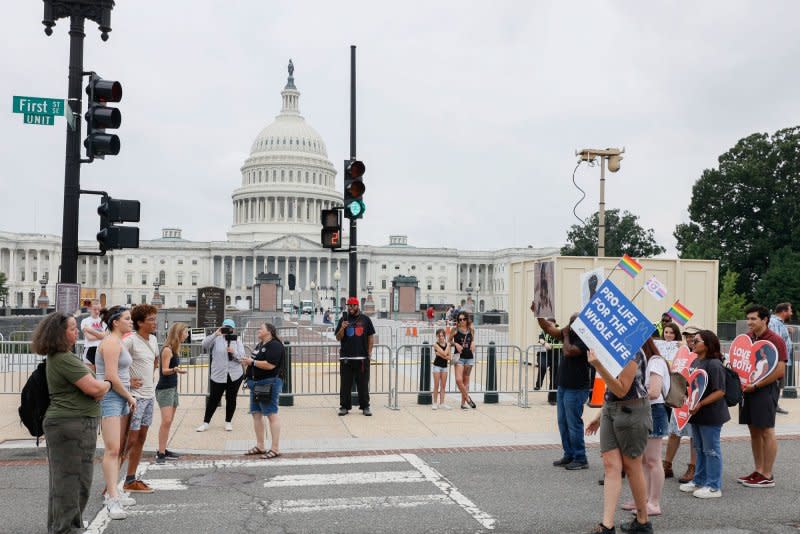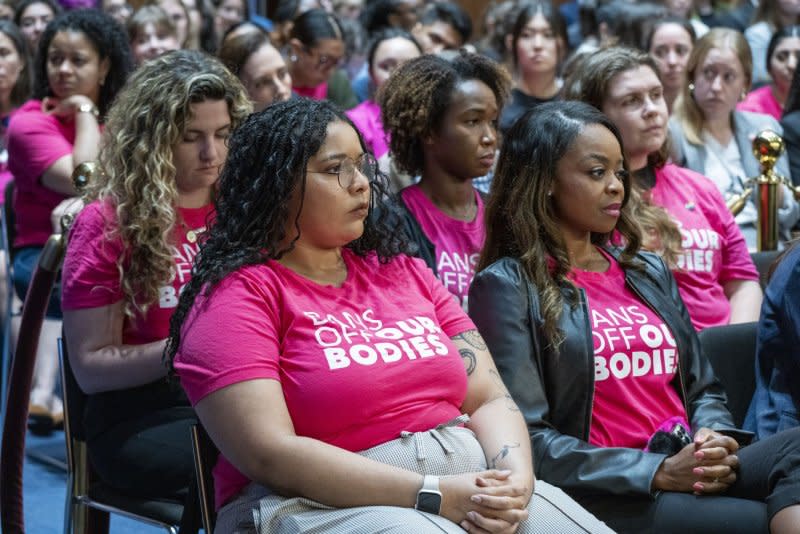2 years after Dobbs, states with constitutional abortion right 'not out of the woods'

June 24 (UPI) -- In the two years since the Supreme Court's Dobbs decision six states have passed constitutional amendments to enshrine the right to an abortion. There is still fear that those rights could be taken away.
In states with restrictions, healthcare providers must balance the health of their patients with the legality of delivering certain types of care after the Supreme Court ruled to overturn Roe vs. Wade in the case Dobbs vs. Jackson.
"Because we exist in the United States there are still threats to reproductive freedom that pertain to Michigan," Eli Savit, prosecuting attorney for Washtenaw County, Mich., said during a webinar with the Public Rights Project on Tuesday. "We are not out of the woods."
Savit and others have seen confusion created by legal battles and disinformation campaigns, both of which have put women at risk.
Abortion rights proponents scored a victory during the midterm elections in Michigan, California and Vermont, and other states have expanded access. November's elections could turn the tide though.

The Comstock Act is one of the major threats to abortion access Savit and others discussed during their webinar. He said it could disrupt access to abortions across the country.
About 56% of the abortions that occurred in 2021 -- the year with the most recent data set -- were medication abortions, according to the Centers for Disease Control and Prevention. The most common medication used for these procedures is a combination of mifepristone and misoprostol.
The Supreme Court unanimously ruled last week against banning mifepristone.
Abortion medications like mifepristone are most commonly delivered to patients by mail. This is where the Comstock Act becomes relevant.
The Comstock Act, introduced in 1873, prohibited mailing material that was considered lewd, immoral or indecent. It was repealed in 1957, but Project 2025 documents detail the intentions of conservative policymakers to resurrect the Comstock Act with the intention of prohibiting the distribution of abortion medications.
Project 2025 is a 920-page policy mandate created by a group of more than 400 conservative scholars and policymakers, published by the Heritage Foundation.
"The victories that we've had in Michigan to maintain abortion access really could be undone with an aggressive effort by the feds and the U.S. Department of Justice to, among other things, enforce the Comstock Act," Savit said.
Dara Kass, an emergency physician and former regional director at the U.S. Department of Health and Human Services, added that removing access to abortion medications would cause "collateral damage" to other types of treatment.
Mifepristone and misoprostol are also used to assist women who have had a miscarriage. It is considered the least invasive treatment for a miscarriage. Misoprostol is also used to treat ulcers, while mifepristone is used to treat hyperglycemia related to Cushing syndrome.
Other drugs could be impacted as well. Methotrexate, a drug used to treat ectopic pregnancies, is also used to treat patients with lupus, cancer and rheumatoid arthritis.
Kass, who practices in Idaho, said physicians in her state are monitoring the Supreme Court case Idaho and Moyle vs. United States.
The Department of Justice sued the state of Idaho in 2022 over its abortion ban. It argued that the ban is in conflict with the Emergency Medical Treatment and Labor Act. The act was passed in 1986 and prohibits healthcare providers from denying treatment to uninsured patients in emergency situations.
The Supreme Court agreed to take up the case and heard arguments in April. It has not issued a ruling.
Kass said the abortion ban in Idaho effectively encourages, if not requires, doctors to allow women to get sicker to the point that it becomes an emergency before providing abortion services.
"Our state has decided that less is what this patient deserves. Not everything you know how to do," she said. "When this decision comes down it will change the standard of care in Idaho, first and foremost. Then every other state that wants to do less. Whose legislature and attorney general and governor want to do less for a patient in an emergency."
Kass added that a ruling in favor of Idaho's abortion ban will cause prosecutors to "second guess" the decisions of medical professionals.
"These cases pit physicians against prosecutors," she said. "We know that that's never good for patient care or for the prosecutors or for the physicians."
Laura Conover, attorney for Pima County, Ariz., has seen similar confusion take hold in her state. The confusion began more than two years ago when former state attorney general Mark Brnovich convinced a state judge to lift an injunction blocking an 1864 abortion ban. This was after the legislature passed a 15-week ban.
The law was in effect prior to the landmark Roe vs. Wade decision. It made providing abortion care, including providing medication for an abortion, a crime punishable by up to five years in prison.
Conover made the legal argument at the time that the law was unclear about what behavior is illegal, violating due process.
"When we're talking about emergency room doctors -- when literally every moment counts in a state of emergency when they are with a patient who they are concerned is in immediate threat of loss of life or permanent damage -- they're pausing because of legal uncertainty," Conover said. "They're pausing from what their expertise and their education tells them to do in this emergency. They are pausing and saying 'We better check with legal.'"
Arizonans are gathering signatures to put an amendment on the ballot to enshrine the right to an abortion in their state constitution. They need 383,923 valid signatures submitted by July 4. Enforcement of the 1864 ban has been stayed until at least Sept. 27, according to attorney general Kris Mayes.


